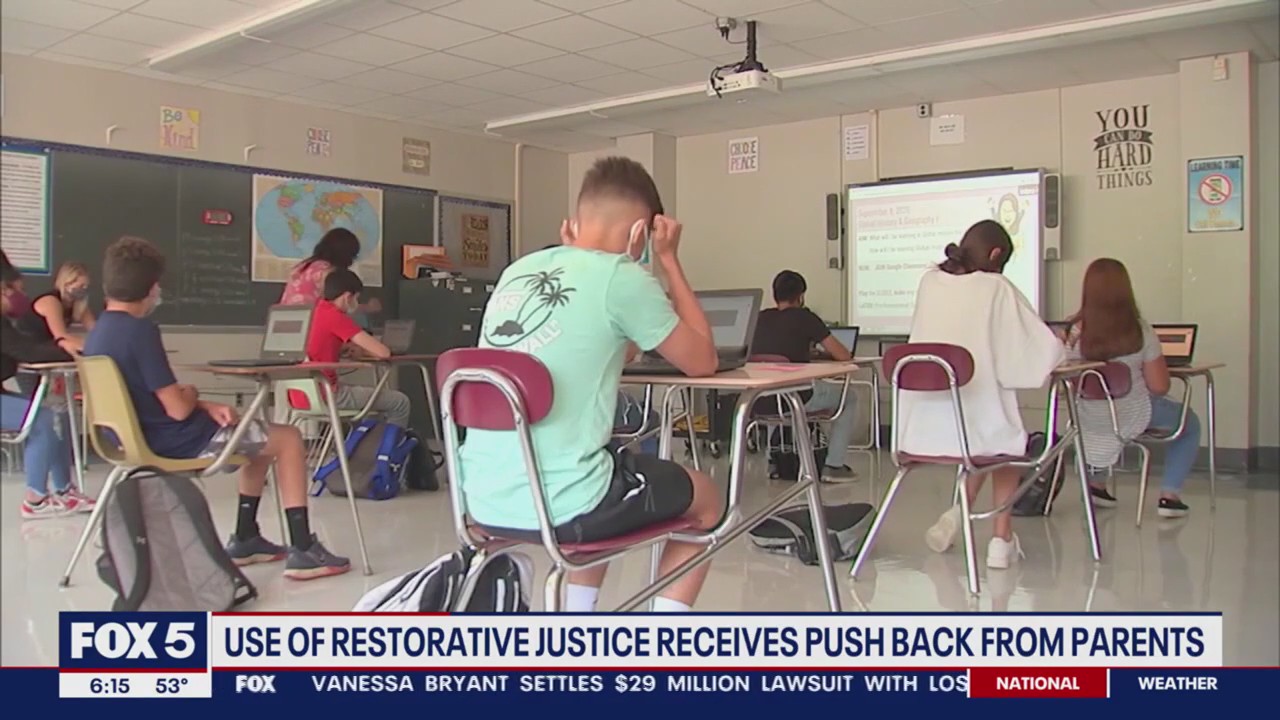MCPS responds to parents’ restorative justice concerns

Use of restorative justice receives pushback from MCPS parents
Montgomery County Public Schools is using restorative justice to address student conflicts – and not everyone is on board. FOX 5’s Stephanie Ramirez reports from the Montgomery County School Board building in Rockville where she got some answers to parents' questions.
ROCKVILLE, Md. - MCPS addressed concerns over its restorative justice approach Wednesday as the school system is now evaluating whether the practices are actually working in accordance with state guidelines.
A Montgomery County Public Schools official told FOX 5 that if there was one myth she could dispel, it would be that restorative justice takes the place of an official police or school investigation.
"The school puts in place the consequence, even after or as they call us," said Shauna-Kay Jorandby, MCPS’ director of student engagement and behavioral health. "And so one thing doesn’t mean the other thing doesn’t happen."
"Student discipline is private and so often, you won’t hear about what happened. But we come in and it seems very public. So that’s kind of the disconnect," she added.
The conversation comes after a February 7 school board meeting where MCPS’ restorative justice practices were discussed.
PTSA leaders tell FOX 5 they’ve been hearing complaints from parents whose children have gone through it.
One parent who spoke with FOX 5 by phone, said she felt restorative justice was inappropriate for the situation her son was in because she didn’t feel her son did anything wrong and the RJ approach has both sides assuming guilt.
The school system says restorative justice is meant to build community and conflict resolution in order to promote a positive school culture and climate. The approaches can range from a community forum to a professionally led student-to-student meeting. Restorative justice can be used to address hate-bias incidents, conflict, or possibly an incident of violence.
MCPS leaders say the Maryland General Assembly made it law for schools to implement and use restorative justice practices in 2019 and that last year, the State Board of Education released guidelines on how to evaluate whether it’s working.
Jorandby says the majority of their RJ work focuses on preventative conversations and planning. However, MCPS does also note a small percentage is used for mediation or response to an event/incident.
MoCo360 recently reported on complaints about a conflict resolution circle involving antisemitic language used where students raised concerns about not being heard in that circle.
Other concerns voiced include whether a student could be forced to meet with their potential aggressor. There are also concerns over whether parents are required to be notified.
In a February 7 MCPS School Board meeting, a Hallie Wells Middle School 8th grader testified in a video that while she’s thankful for ongoing restorative justice practices she's found that RJ is not always consistent from school to school.
"From my point of view, in order for RJ to work best, students must be asked if they are comfortable joining circles before they are brought into them," the student said. "Once a circle is completed, a follow-up should be held with the students. And while it might not be convenient sometimes, families should be notified before or right after a circle takes place so they can support their children at home because there are times when a circle can actually be triggering for students. It’s very important that all families be part of what their students are learning at school…"
"I will say that’s something we’re making sure that we’ve improved upon now," said Jorandby on the question of whether students can "opt out."

MCPS to address bathroom safety concerns as parents voice frustrations
Bethesda Chevy Chase High School parents are gearing up for a meeting Monday night with Montgomery County Public Schools leaders. FOX 5's Stephanie Ramirez reports from the high school with details.
She tells FOX 5 it’s encouraged students participate in restorative justice, but she also added, "There’s a form that we’re doing now. It’s a Google survey that we say, in addition to the community agreements that are in the presentation when we begin, there’s now a form that we actually have people fill out. Now, that only applies to when my office’s team comes out because we’re not necessarily in those schools."
Jorandby’s "my office’s team" comment refers to the restorative justice specialists MCPS now employs. She says MCPS went from three last year to nine this year – with all nine fully trained. She added most of the specialists are counselors when they come in.
FOX 5 was told MCPS has about 66 coaches in secondary schools and about 136 coaches in elementary schools to assist. Mental health professionals and community partners assist in RJ approaches.
Jorandby said the coaches are teachers who have special training and receive a stipend to carry out, for example, a restorative justice approach after school.
Jorandby explained that teachers have restorative conversations with students in conflict all the time. It’s not always identified as "restorative" and they don’t always inform parents, although Jorandby feels a phone call is best practice.
She also says MCPS is planning to expand how parents are notified.
MCPS has until the end of March for all of its 210 schools to report its restorative justice evaluations.
As of March 1, MCPS has 171 schools reporting how restorative their environment is.
In May, MCPS says it will review what additional supports and training need to happen.
You can watch the school board conversation on Restorative Justice here.

